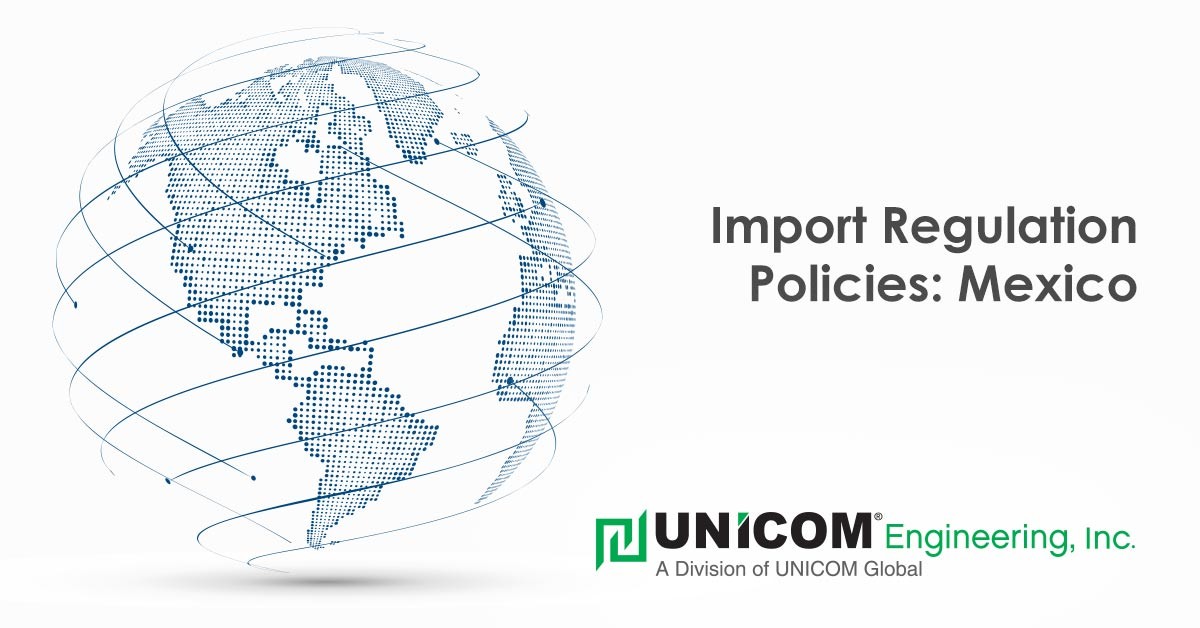The international market is full of opportunities to expand your customer base, as long as you can successfully navigate the maze of import regulations in the countries where your customers are located. Doing so requires consistent monitoring of compliance laws because they are subject to frequent updates and changes. The cost of non-compliance can be steep, causing severe delays or even rejections of your product deliveries. As a value-added systems integrator for leading technology innovators worldwide, UNICOM Engineering employs a staff of international shipping and compliance experts that track changes in the global regulatory environment to ensure our customers’ safe and timely shipments around the globe.
Providing a significant example of such a change, Mexico recently updated its importation process with an amendment to Annex 2.4.1 (referred to as the “NOM Annex”) of the country’s General Import and Export Tax Law. Whether you sell products into Mexico today or plan to in the future, it is important to understand this amendment as it may have serious implications for your business.
Background on Mexican Import Regulations
Mexico’s Federal Law on Metrology and Standardization governs the country’s standards system. On October 23, 2018, Mexico announced an amendment to the NOM Annex, a section within the law that identifies the HS codes of imported products that must comply with mandatory technical regulations and labeling requirements. These requirements are referred to as Normas Oficiales Mexicanas (NOMs). The amendment officially went into effect on June 3, 2019, and no doubt there are many companies still grappling with its impact today, especially those without in-house compliance support.
How the NOM Annex changed and What it Means for Mexican Importers
The NOM Annex changes require every product importer into Mexico to be listed as the holder of the NOM certificate being used to prove regulatory compliance during the import process. Any company that wishes to import into Mexico that does not have an in-country importer must arrange with the original NOM certificate holder to transfer ownership to the organization responsible for importing. This step was not previously necessary, but it is now essential.
In the past, importers were able to utilize exceptions listed in Article 10, Section VII (products imported for the company’s own use), and Section VIII (products that will be used for professional use, industrial, or manufacturing process) to import products without a compliance certificate, but these exceptions are no longer available to organizations shipping into Mexico. The Mexican importer now must hold the NOM certificate for the product being imported. Only the original owner of the NOM certificate can extend a NOM certificate to a third-party Mexican importer.
Extending Ownership of a NOM Certificate
It is important to note that an original owner of a NOM certificate does not have to be the importer. Still, a NOM certificate held by a non-importer cannot be used to import into Mexico. If this is the case, then the NOM owner would need to extend ownership to a Mexican entity that would perform the import. An “extended” NOM is valid from the date of issue to the expiration date of the original NOM certificate.
Implementing this would require organizations that wish to import into Mexico to obtain a NOM certificate in their name that can be extended to any of their customers in Mexico. This NOM would be valid for one year. On the other hand, if the organization already has a distributor or other group importing for them into Mexico, they can transfer the NOM into that group’s name, thereby bypassing the need to extend ownership. The cost to extend a NOM to another entity is $1,100 and typically takes about two weeks to be finalized from the date of submission.
Partner with an Expert in Regulatory Compliance
The global regulatory environment is dynamic and complex. Seemingly minor tweaks in policies can cause headaches for companies involved in international trade, especially those without expert help. Fortunately, when you partner with UNICOM Engineering, you do not have to worry about regulatory compliance because we take care of it for you.
With the policy alterations regarding Mexico highlighted above, our team of experts can handle all the paperwork and other administrative tasks associated with extending NOM ownership to another party when necessary. Additionally, we can help with any other work required for ensuring your products continue arriving to your customers on time as expected. When new changes inevitably emerge in the future, our team will be there to help you successfully navigate them as well. If you would like to learn more about how we can ensure that your products are compliant with the requirements for exporting to countries worldwide, contact us today to schedule a consultation.
